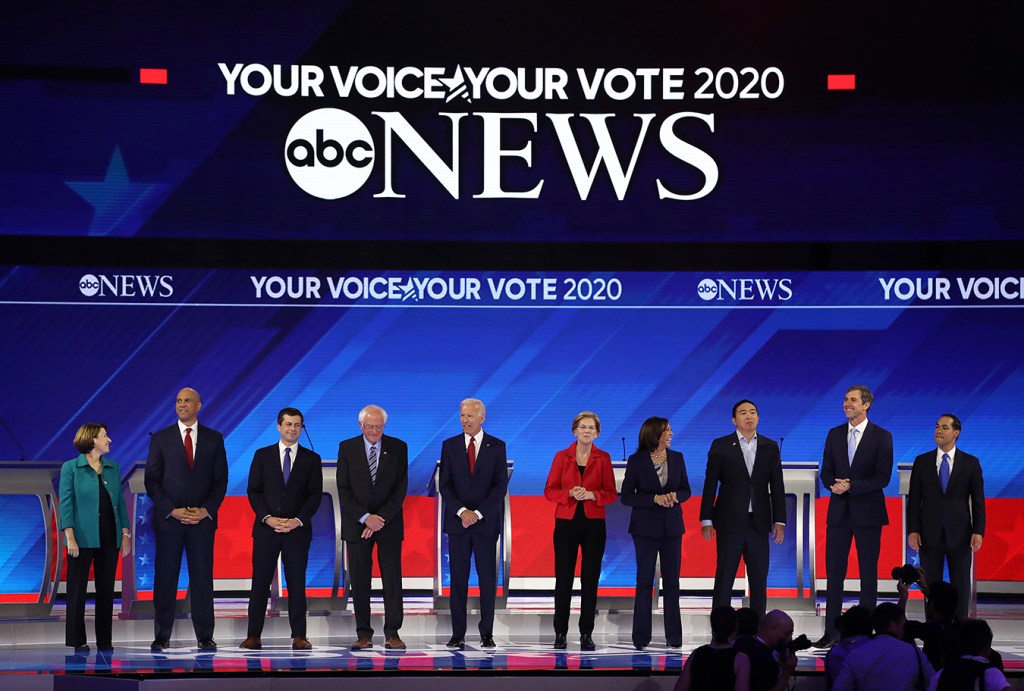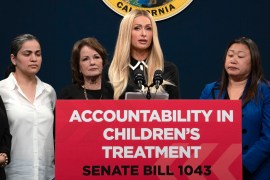Unity was in the air on Thursday, as a trimmed-down cast of 10 Democratic presidential candidates met on the debate stage again and nodded to the stakes: the possibility of another four years of President Donald Trump.
And then the opening statements concluded.
The first question plunged the candidates into another debate about the merits and missteps of a “Medicare for All” plan. It was a fitting set-up for the marquee match-up of this third Democratic presidential debate, between former Vice President Joe Biden — whose health care proposal includes a government-run public option insurance plan — and Sen. Elizabeth Warren of Massachusetts, a backer of Medicare for All, which some advocates see as a way to provide a single health plan for the entire country and replace all private insurance.
But no debate about Medicare for All can exclude the man who, in his own words, “wrote the damn bill,” Sen. Bernie Sanders of Vermont. And within the debate’s first moments, there were three presidential hopefuls batting around big numbers and “to be clear” defenses of their plans.
The dividing line was drawn: On one side were Warren and Sanders, advocating for another major reform of the health care system. On the other was Biden.
“I know the senator [Warren] is for Bernie. Well, I’m for Barack,” he said, referring to former President Barack Obama.
“I think the Obamacare worked,” he added. Biden explained his plan would reinstate aspects of the Affordable Care Act that had been dismantled under the Trump administration and Republican-controlled Congress, as well as build on it by adding a public option and expanding subsidies to help people afford coverage.
Biden also focused on the price tag — in the case of his plan, about $740 billion, he said.
“My plan for health care costs a lot of money, but not $30 trillion,” he said, directly referencing Sanders’ Medicare for All plan. “How are we going to pay for it?”
“Joe said that Medicare for All would cost over $30 trillion. That’s right, Joe,” Sanders said. But, he continued, that’s a lot cheaper than the $50 trillion he said the current health care system would cost over 10 years.
In an email, a Sanders spokeswoman cited projections from the libertarian-leaning Mercatus Center that national health spending will hit $59.65 trillion between 2022 and 2031.
Biden charged that neither Warren nor Sanders have completely explained how they will pay for Medicare for All.
“Those at the very top, the richest individuals and the biggest corporations, are going to pay more. And middle-class families are going to pay less,” Warren said. “That’s how this is going to work.”
This Democratic debate, held in Houston at Texas Southern University, marked the first during this election season to be contained to a single night — over the course of three hours, to be sure. The 10 candidates were the only ones in the sprawling field who met the fundraising and polling criteria necessary to qualify.
The sharpest exchanges came between Julián Castro, the former secretary of Housing and Human Development, and Biden over details of their health plans. But in his rebuttal to Biden, Castro suggested that Biden couldn’t remember the details he had just delivered. A PolitiFact check of Castro’s statements found that his claims were mostly false.
Each candidate staked out a place on the health policy continuum, such as former Texas Rep. Beto O’Rourke’s idea to put the uninsured on Medicare.
And at times, some of the candidates would again remind viewers (and one another) that they held more in common than not — that all were working toward the ultimate goal of universal coverage.
“Everyone on this stage is well-intentioned,” said Sen. Kamala Harris of California. But she also issued a reminder that Trump has worked aggressively to fight the ACA — even taking it to court — and listed some of its most popular provisions, such as its protections for people with preexisting conditions and the ability to stay on your parents’ insurance until you turn 26. “If we don’t get Donald Trump out of office, he’s going to get rid of all of it,” she said.
Sen. Amy Klobuchar of Minnesota noted that she and Sanders had teamed up on prescription drug issues in the Senate. But when it comes to Medicare for All, she said, “I go with the doctors’ creed: ‘Do no harm.’”
“I don’t think that’s a bold idea,” Klobuchar added, voicing her support for a public option. “I think it’s a bad idea.”
Mayor Pete Buttigieg of South Bend, Ind., also endorsed the public option, adding he trusts Americans to “choose what makes the most sense to you.”
The public option is broadly popular, according to a new Kaiser Family Foundation poll released Thursday. About 69% of all Americans support a government-administered public option health plan that consumers could choose, the findings showed. About 41% of Republicans said they support a public option.
Sanders also raised a few eyebrows when he claimed that 50 million people experience at least a temporary gap in their insurance every year due to changes to their employment benefits — a number that his spokeswoman later attributed to an analysis from the People’s Policy Project, a think tank that backs Medicare for All.
But among other things, Sanders misquoted the analysis: The think tank actually makes its claim about adults under age 65 in general — not just those who quit, were fired or experienced some other form of benefits change. (A PolitiFact check found the statement mostly false.)
The next Democratic debate is set for Oct. 15, with a possible second night on Oct. 16 — depending on how many candidates are still qualifying (and standing).







